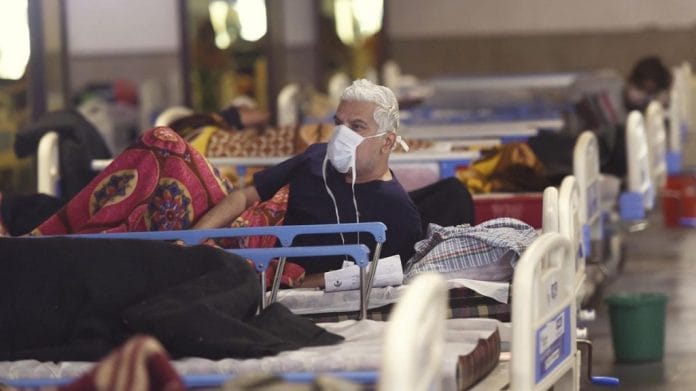New Delhi: The Supreme Court Thursday took suo motu cognisance of issues related to the management of the Covid-19 pandemic in the country.
Chief Justice of India S.A, Bobde specifically pointed out four issues which demand attention. These relate to supply of oxygen, supply of essential drugs, method and manner of vaccination, and the need for empowering the state government to declare lockdowns. The bench, also comprising Justices L. Nageswara Rao and S. Ravindra Bhat, issued notice to the central government on these issues, and appointed senior advocate Harish Salve as the amicus curiae.
This came while the court was hearing an application filed by Vedanta, seeking permission to reopen its plant only for the purpose of producing oxygen for supply of medical oxygen to Covid-19 patients. The plant has been shut since 2018 over environmental violations.
During the hearing, Justice Bobde noted that at least six high courts have so far issued orders related to Covid, such as supply of medicines and the imposition of lockdowns. The apex court, however, asserted that while it is laudable that high courts are taking action on Covid-related issues, it seems to have created “some confusion and diversion”.
The court then hinted that it might withdraw some of these cases from the high courts and take them up instead. The Supreme court will consider the matter Friday, he said.
Hours after the court’s order initiating the suo motu case, however, the Supreme Court Bar Association (SCBA) filed an impleadment application – an application demanding to be added as a party to a case – in the apex court, opposing it’s decision, and urging it to allow high courts to deal with COVID related issues at the local level. The SCBA in its application stated that high courts “appear to be best suited to deal with the situation”.
The application, seen by ThePrint, and filed through SCBA president and senior advocate Vikas Singh, stated, “High Courts, situated almost invariably in the capital of the states, are in a better position to seek immediate reports from the local administration, and pass directions and orders for immediate removal of difficulties arising in treatment of the infected patients, depending upon local emergent situation. State machineries are lacking on various aspects and Hon’ble High Courts are suitably dealing with the issues prevailing at local level within their territorial jurisdictions.”
Also read: PM Modi’s speech was short – on answers that Indians demand of him during second Covid wave
High courts on Covid
With the second wave of the Covid-19 pandemic overwhelming the health infrastructure across the country, almost a dozen high courts across the country have started issuing orders to propel swift action by state governments.
At least 10 high courts — in Gujarat, Delhi, West Bengal, Tamil Nadu, Madhya Pradesh, Maharashtra, Telangana, Bihar, Karnataka and Uttar Pradesh — have issued a wide range of orders on the pandemic so far. These include asking governments to ramp up oxygen and medicine supply, updating data on availability of beds, imposing near-lockdowns, directing adequate facilities for migrant labourers, ordering strict implementation of Covid-19 guidelines for elections and many others.
To this end, the high courts have revived old petitions, filed last year, taken suo motu cognisance of the situation once again or heard new petitions on the surge of Covid cases.
Some of these orders have spurred the state governments into action, as was done after directions by the Patna High Court and the Telangana High Court.
For instance, the Patna High Court had taken suo motu cognisance of the “alarming surge in Covid-19 cases in the State of Bihar … and the lack of facilities and healthcare system to meet the challenges arising out of the surge”.
The first order was passed on 15 April this year, taking note of news reports of patients “running helter-skelter” to find beds in government and private hospitals.
A day after this order, the Bihar government designated two more hospitals as dedicated Covid hospitals.
Not all high court orders relating to the pandemic have, however, been equally successful. The Allahabad High Court’s order imposing a near-lockdown in five cities in Uttar Pradesh Monday was stayed by the Supreme Court a day later after the state government approached the top court.
(Edited by Poulomi Banerjee)
Also read: Top officials earn Modi flak — ‘should have been better prepared’ to handle 2nd Covid wave






